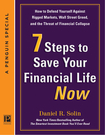
In my blog last week, I urged CNBC to cancel Jim Cramer's Mad Money show. It remains my view that this show is filled with misinformation that harms investors by perpetuating the myth that some guru has the ability to pick stock "winners" that will outperform the market. I referenced the many studies of Cramer's stock picks indicating his "hits" were no better than what you might expect from random chance. You could throw a dart at a list of stocks and have every bit as good a chance of picking a winner as Jim Cramer.
Cramer has some credibility because of his egocentric personality, his antics (which his viewers find entertaining) and his background as a hedge fund manager. His record as a successful hedge fund manager is often bandied about as justification for believing in his expertise, but a closer examination reveals some issues with taking his stellar record as a given. As Henry Blodget correctly noted, Cramer made his money in the late 1990s, when the overall markets were soaring. Blodget observed the lack of any independent analysis comparing Cramer's hedge fund to others during this period or measuring the amount of risk his fund was taking. Without this information, we just don't have enough information to validate claims that Cramer was a great stock picker.
There is no indication that hedge fund managers have any special expertise in stock picking. According to an article in The Economist, the HFRX, which is a measure of hedge fund returns, is up only 3 percent as of Dec. 22, 2012. The S&P 500 returned 18 percent for the same period. The S&P 500 index has outperformed the hedge fund benchmark index for 10 straight years, with the exception of 2008, when both indexes sharply declined.
The evidence is overwhelming that no one has the ability to peer into a crystal ball and select outperforming stocks with any greater certainty than you would expect from luck alone. The forum CNBC gives Cramer serves to perpetuate a myth to the contrary, but it's really more insidious. The daily grist of CNBC is a parade of self-styled market pundits regaling viewers with predictions about the direction of the markets, hot mutual funds, and undervalued stocks. Cramer's show provides the underpinnings for their musings. The unstated premise is that, since Cramer has special insight, these people do as well.
CNBC lacks the courage to run a financial show that would counterbalance the errant nonsense of Cramer's rantings. Consider how valuable it would be to investors if someone stood up to Cramer and discussed all the reasons why his recommendations made no sense. While CNBC's fear of engaging in balanced financial reporting is understandable, because of its reliance on the securities industry for advertising revenues, its lack of ethics is indefensible.
What's the good news? The Economist reports The Nobel Foundation is going to increase its investment in hedge funds. I have to assume it's suffering from cognitive dissonance. This is the foundation that awarded Nobel Laureates in Economics to Paul A. Samuelson, William F. Sharpe, Daniel Kahneman and Merton Miller, all of whom have been quoted as extolling the virtues of index based investing, which is the antithesis of investing in a hedge fund.
If you want to ignore the data, you can buy hedge funds and watch Mad Money. If you believe CNBC should take this show off the air and literally "stop the madness", contact them and let them know how you feel. You can find contact information here.

